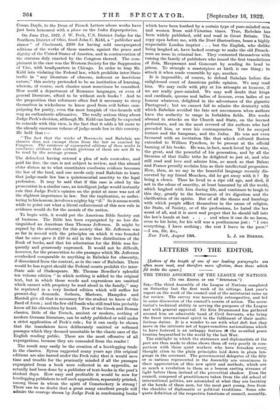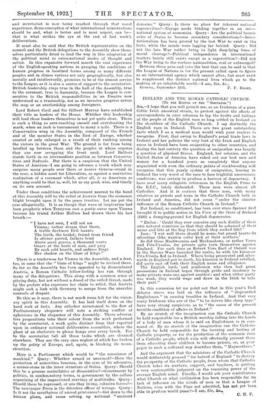LETTERS TO THE EDITOR.
[Letters of the length of ons of our leading paragrapits are often more read, and therefore more effective, than those which fill treble the space.] THE THIRD ASSEMBLY OF THE LEAGUE OF NATIONS.
[To THE EDITOR OF THE " SPECTATOR."]
SIR,—The third Assembly of the League of Nations completed on Saturday last the first week of its sittings. Last year's report on the work of the council and of .the secretariat came up for review. The survey was necessarily retrospective, and led to some discussion of the council's course of action. The secre- tariat's technical ability in serving the purposes of the League met with general approval. Sir Eric Drummond has gathered around him an admirable band of Civil Servants, who bring the finest international spirit to the fulfilment of their multi- farious duties. It is a wonder to see with what deft feet they move in the intricate net of hyper-sensitive nationalisms which to have fostered is an unhappy feature it the so-called peace treaties bequeathed to the world by the last War.
The sidelight in which the statesmen and diplomatists of the past are thus made to shine shows them off very poorly in com- parison with those quiet workers who have forsaken every, thought alien to the plain principles laid down in plain lan- guage in the covenant. The governmental delegates of the fifty or so nations represented in the Assembly are unanimous in their appreciation of this new spirit and methods, which are as much a revelation to them as a beacon casting streams of light before them instead of the proverbial shadow. Even the council, composed of practitioners taken from the old school of international politics, are astonished at what they are learning at the hands of these men, for the most part young, free from the shackles of diplomatic or political traditions. Some ade- quate definition of the respective functions of council, assembly, and secretariat is now being reached through that novel experience. Some conception of what international ministrations should be and, what is better and is most urgent, can be— that is what strikes the eye at the end of last week's deliberations.
It must also be said that the British representative on the council and the British delegations to the Assembly show them- selves particularly fitted to lead the way in this adaptation of the political mind to extra-national modes of thought and action. In this expansive forward march the vast experience of the English-speaking nations in grasping the conditions of human progress in localized forms among so many different peoples and in climes various not only geographically, but also morally and intellectually, promises to be of the utmost service to the League, as it is also a source of support to the secretariat. British leadership rings true in the hall of the Assembly, true to the covenant, true to humanity, because the League is con- secutive to the British responsibilities in 'an Empire now understood as a trusteeship, not as an invasive progress across the map or an overlordship among foreigners.
Lord Robert Cecil and Sir Gilbert Murray have established their title as leaders of the House. Whither this leadership will lead those leaders themselves is not yet quite clear. There is such a thing as over-reaching oneself and overshooting the 'mark, when an inch is tantamount to many a mile. There is a Conservative wing in the Assembly, composed of the French and of the member States in the East of Europe, whether created or only enlarged as a result of their ranking among the victors in the great War. The ground is far from being levelled up between those and the peoples at whose expense they are now occupying the front rank. Lord Balfour stands forth in an intermediate position as between Conserva- tives and Radicals. But there is a suspicion that the United States of America—I am going to advance a truth which may surprise many people over there or nearer Geneva—stand in the rear, a hidden asset for Liberalism, as against a restrictive realization of a covenant which, after all, is as American as anything could be that is, well, let us say good, wise, and timely on its own account.
Under those conditions the achievement nearest to the hand of this Assembly will be the relief of Austria from the economic blight brought upon it by the peace treaties. Let me put the case allegorically. It is as though that wave of inspiration had been prophetic when Tennyson cast a poetic curse upon Vienna because his friend Arthur Hallam had drawn there his last breath:—
" I have not seen, I will not see
Vienna; rather dream that there, A treble darkness Evil haunts The birth, the bridal; friend from friend Is oftener parted, fathers bend Above more graves, a thousand wants tinarr at the heels of men, and prey By each cold hearth, and sadness flings Her shadow on the blaze of kings."
There is a tenderness for Vienna in the Assembly, and a fear, too, in some that the " blaze of kings " might be revived there. So far as the Assembly has been appealed to by dismembered Austria, a Roman Catholic fellow-feeling has run through many of the delegations. This along with a common sense of pitying duty, but not without a dread of the veiled threat, made by the prelate who expresses her claim to relief, that Austria might seek a link with Germany to escape from the anarchic counsels of despair.
Be this as it may, there is not much room left for the vision- ary spirit in this Assembly. It has laid itself down on the hard rock of facts. Any onlooker accustomed to the flow of Parliamentary eloquence will note a striking conflict of aphorisms in the eloquence of this Assembly. There adversa- tive propositions take their colour from the work performed by the secretariat, a work quite distinct from that reported upon in ordinary national deliberative assemblies, where the ghost of an electorate to please hangs over every bench. For to the secretariat fall all those tasks which aro shunned elsewhere. They are the very ones neglect of which has broken up the polity of Europe, and, again, is blocking its recon- struction.
Here is a Parliament which would be " the conscience of mankind." Query : Whether armed or unarmed?—Here the protection of minorities becomes, in the eyes of its advocates, a corner-stone in the inner structure of States. Query : Should this be a process assimilative or dissociative?—Government by politics, in condemnatory terms, is government by the callous organizing of the impassioned cravings of multitudes. Query : Should these be repressed, or are they living, cohesive forces?— The newspaper Press is the detective officer of wrongs. Query : Is it not the mouthpiece of unreal grieVances?—Get down to the human plane, and cease setting up national "eminent
domains." Query : Is there no place for inherent national superiorities?—Europe needs binding together in an inter- national system of economics. Query : Are the political bound- aries of States to become secondary considerations?—Inter.. nationalism has been proved by the last War to exist in the facts, while the minds were lagging far behind. Query : Did not the late War rather bring to light deep-lying lines of moral cleavage P—Political independence in international matters barely still exists except as a superstition P—Did not the War bring to the surface nationalities, real or submerged? Between these pros and cons the best that can be said is that the League of Nations is for the present called upon to figure as an international agency which cannot alter, but must exist to supplement the distinct national lives which go to the making of an inhabitable world.—I am, Sir, &c.,



































 Previous page
Previous page